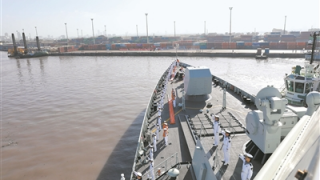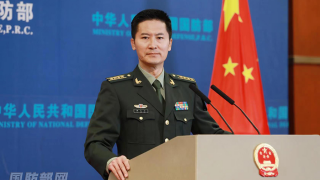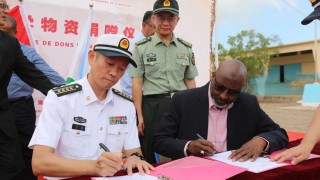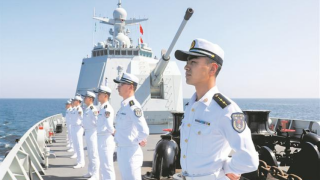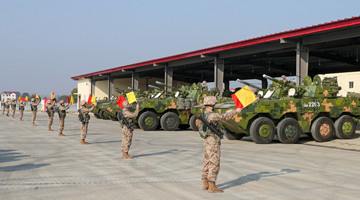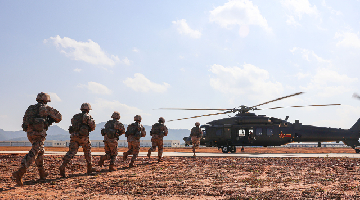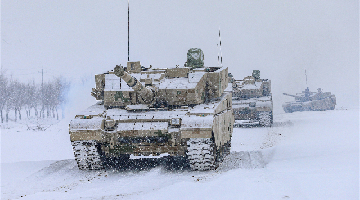By Xiang Haoyu
The deputy foreign ministers of the US, Japan and the ROK held talks in Washington on February 13. The meeting is the latest example of the US's recent efforts to increase its strategic pull on Japan and the ROK. The US is making every effort to promote trilateral military cooperation with Japan and the ROK and create an "iron triangle" of the three countries to play a frontline role in containing China, the DPRK, and Russia. The topic of the US-Japan-ROK alliance continues to draw attention.
As the US's two major allies in East Asia, Japan and the ROK have large-scale US military bases. The US-Japan and US-ROK alliances constitute the cornerstone of the US global alliance system in East Asia. Since taking office, the Biden administration has valued the geopolitical strategic value of Japan and the ROK and pushed for the extension of the US-Japan and US-ROK alliances from Northeast Asia to the so-called “Indo-Pacific” and even globally to implement its strategy of containing China. Tokyo and Seoul see this as a good opportunity to boost their international status and have increased their strategic dependence on the US, and actively participated in the US-led security, economic, and technological alliances.
In the future, the US, Japan, and the ROK may further strengthen coordination and cooperation in security, economy, trade, technology, and global and regional affairs. In the field of military security, the topic of cooperation may expand from dealing with DPRK's nuclear and missile development to the so-called Indo-Pacific affairs, and the content of cooperation will also change from conventional joint military exercises targeting DPRK to actual combat exercises including anti-missile exercises, anti-submarine exercises and landing operations. They will establish and improve the trilateral intelligence sharing and joint command operations mechanisms and the US may give the two more autonomy in military operations. In the field of economy, science and technology, they will focus on maintaining their monopoly advantages in high-end industrial chains and high-tech fields and seek to seize the dominance of cutting-edge technical standards and economic and trade rules to consolidate their technological hegemony.
However, in the short to medium term, due to factors such as conflicts between Tokyo and Seoul and differences in interests, it is still difficult for the trilateral cooperation to develop into a trilateral alliance. They face at least three constraints on the way to build a trilateral alliance.
First, the long-standing conflicts between Japan and the ROK will restrict the level of trilateral cooperation for a long time. The ROK has a hard time getting rid of the history of being colonized by Japan. They have complicated and sharp conflicts over issues such as forced labor, the "comfort women", and island sovereignty, which will still affect the improvement and development of their relations. Public opinion in the ROK disagrees with the ROK-Japan alliance, holds a grudge against Japan's dream of becoming a military power, and is especially worried that Japan will take advantage of the DPRK issue to interfere in the Korean Peninsula affairs militarily.
Second, Tokyo and Seoul have different security demands, and Washington's different relations with Tokyo and Seoul will affect Seoul's enthusiasm. Compared with the US and Japan, the ROK's perception of the threat from China and Russia is not prominent. For ROK, the main purpose of participating in trilateral cooperation is to prevent and deter DPRK. And its fundamental demand is to use the strength of the US and Japan to create conditions for achieving the ROK-led reunification of the peninsula. In the meantime, the US has different attitudes towards Japan and the ROK. Regardless of diplomatic investment or positioning of bilateral relations, the status of the US-Japan alliance in US foreign strategy is much higher than that of the US-ROK alliance. The different attitudes of the US will stir up the sensitive nerves of Seoul from time to time and discourage its enthusiasm to participate in trilateral cooperation.
Third, different demands of interests in regard to China will restrict the formation of a trilateral alliance. The US positions China as its biggest strategic rival, and the promotion of the trilateral alliance is clearly directional. However, due to geopolitical factors and economic interests, the US, Japan, and the ROK differ in their strategic demands toward China, their capabilities and intentions to confront China, and their threshold for damaging their relationships with China. Japan and the ROK's support for the US in containing China will be selective and limited. Therefore, it will not be easy for the US to build an anti-China alliance among the three countries.
In the US-Japan-ROK, China-Japan-ROK, and China-US-ROK relations, the ROK is always the party with more complex factors to consider. Due to its geographically sandwiched location between major powers, coupled with a relatively small population and economy, Seoul does not have the leverage to "rely on the US to contain China". In the face of international and regional changes, Seoul needs to maintain strategic sobriety. Blindly catering to the US and Japan will only further worsen the situation on the Peninsula, squeeze its own strategic maneuvering space, and damage its long-term interests.
(The author is a specially appointed research fellow at the Department for Asia-Pacific Studies at the China Institute of International Studies)
Editor's note: Originally published on huanqiu.com, this article is translated from Chinese into English and edited by the China Military Online. The information and opinions in this article do not necessarily reflect the views of eng.chinamil.com.cn.
